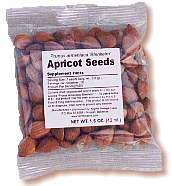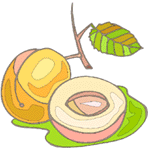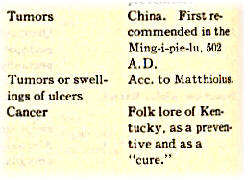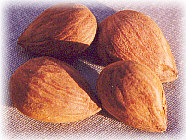
 ong respected
in the pharmacopaeias of TCM (traditional Chinese medicine), apricot seeds
(also known as "bitter almonds," and botanically as "prunus armeniaca")
have been used for thousands of years to
treat respiratory problems. They are used by practitioners in the
treatment of . . . ong respected
in the pharmacopaeias of TCM (traditional Chinese medicine), apricot seeds
(also known as "bitter almonds," and botanically as "prunus armeniaca")
have been used for thousands of years to
treat respiratory problems. They are used by practitioners in the
treatment of . . .
- Asthma
- Bronchitis
- Constipation
- Emphysema
- Wheezing (and coughing)
 Apricot seeds contain
Vitamin B-17, which, in the body, produce a metabolite of cyanide.
For that reason they should only used by experienced herbalists
and practitioners familiar with their use. They should never be
used on small children (under 12). In accordance with Chinese
tradition, we also advise that they not be combined with
astragulus, skullcap, or kudzu root. The toxicological effects
of overdose include: dizziness, nausea, vomiting and headache.
In addition, patients with diahrrea should not consume
apricot seeds, either. Apricot seeds contain
Vitamin B-17, which, in the body, produce a metabolite of cyanide.
For that reason they should only used by experienced herbalists
and practitioners familiar with their use. They should never be
used on small children (under 12). In accordance with Chinese
tradition, we also advise that they not be combined with
astragulus, skullcap, or kudzu root. The toxicological effects
of overdose include: dizziness, nausea, vomiting and headache.
In addition, patients with diahrrea should not consume
apricot seeds, either.

 There are a substantial
number of claims on the internet concerning the cancer-fighting
benefits of apricot seeds. We are close to one medical doctor
in Los Angeles (who must remain anonymous) that did research on
Vitamin B-17 (also known as "amygdalin" from which the drug
"Laetrile" is produced) in the 1960's. He found that the
threshold dosage at which B-17 really made a noticeable
difference was also the dosage at which it became toxic to
the body. "At best," he told us, "it is, in small amounts,
a good long-term preventative, of sorts. At worst, it can
make you quite ill - perhaps even kill you." There are a substantial
number of claims on the internet concerning the cancer-fighting
benefits of apricot seeds. We are close to one medical doctor
in Los Angeles (who must remain anonymous) that did research on
Vitamin B-17 (also known as "amygdalin" from which the drug
"Laetrile" is produced) in the 1960's. He found that the
threshold dosage at which B-17 really made a noticeable
difference was also the dosage at which it became toxic to
the body. "At best," he told us, "it is, in small amounts,
a good long-term preventative, of sorts. At worst, it can
make you quite ill - perhaps even kill you."
Why We Don't Recommend
Apricot Seeds As A Cancer Treatment
 Because Alpha Omega Labs
deals in nutraceutical products, the components of which have
provable effects on cancer, a reader might think that
our interest in apricot seeds is in connection with
our worldwide work in alternative cancer nutraceuticals.
(After all, our original domain is "altcancer.net".) Because Alpha Omega Labs
deals in nutraceutical products, the components of which have
provable effects on cancer, a reader might think that
our interest in apricot seeds is in connection with
our worldwide work in alternative cancer nutraceuticals.
(After all, our original domain is "altcancer.net".)

 As it turns out, this is not
the case. In the seminal work upon which our original formulas
are based, Plants Used Against Cancer
by Dr. Jonathan Hartwell, apricot is mentioned three times.
Listed under Rosaceae (the botanical Family to which "prunus armeniaca"
belongs), apricot seeds are mentioned in Chinese literature
in the "Ming-i-pie-lu" - circa 502 A.D. The oil appears, secondly,
by way of
Matthiolus
in his "Commentarii in Sex Libros Pedacii Dioscorides" (1544) as
a treament for tumours. Lastly, Hartwell found that apricot
"almonds" were a rich part of medicinal folklore in Kentucky -
both as a preventative and as a "cure." As it turns out, this is not
the case. In the seminal work upon which our original formulas
are based, Plants Used Against Cancer
by Dr. Jonathan Hartwell, apricot is mentioned three times.
Listed under Rosaceae (the botanical Family to which "prunus armeniaca"
belongs), apricot seeds are mentioned in Chinese literature
in the "Ming-i-pie-lu" - circa 502 A.D. The oil appears, secondly,
by way of
Matthiolus
in his "Commentarii in Sex Libros Pedacii Dioscorides" (1544) as
a treament for tumours. Lastly, Hartwell found that apricot
"almonds" were a rich part of medicinal folklore in Kentucky -
both as a preventative and as a "cure."
 Nonetheless, the fact that
apricot was so well known, both to the Chinese and to the Indians -
(brought to them via Euroasian trade routes over two thousand years
ago from the Middle East - and mentioned in aramaic texts -
the "English" of the day), and yet does not have a prominent
place as a cancer treatment in either TCM or ayurvedic traditions,
is, in our opinion, telling. Nonetheless, the fact that
apricot was so well known, both to the Chinese and to the Indians -
(brought to them via Euroasian trade routes over two thousand years
ago from the Middle East - and mentioned in aramaic texts -
the "English" of the day), and yet does not have a prominent
place as a cancer treatment in either TCM or ayurvedic traditions,
is, in our opinion, telling.
 As with most "herbal bitters,"
apricot seeds, when not used by a TCM practitioner for its traditional
use in respiratory ailments, should be taken in small amounts
as a preventative - nothing more. A safe nutraceutical dose for an
adult is 6 to 7 of our Blenheim variety apricot seeds per day.
--- AO As with most "herbal bitters,"
apricot seeds, when not used by a TCM practitioner for its traditional
use in respiratory ailments, should be taken in small amounts
as a preventative - nothing more. A safe nutraceutical dose for an
adult is 6 to 7 of our Blenheim variety apricot seeds per day.
--- AO
|

 Rebuttal: Not everyone shares our
opinion about restrictions on the usage of and claims made on apricot
seeds - or our thoughts on laetrile (see below).
The highest profile counter-opinion would probably be G. Edward Griffin's
World Without Cancer - (for which, like the
Hoxsey project, there is both a book and
a movie version.) If you have a broadband connection,
here's the video.
The portions dealing with "cancer politics" do, however,
conform to our own findings.
--- [Enlarge book cover above.] Rebuttal: Not everyone shares our
opinion about restrictions on the usage of and claims made on apricot
seeds - or our thoughts on laetrile (see below).
The highest profile counter-opinion would probably be G. Edward Griffin's
World Without Cancer - (for which, like the
Hoxsey project, there is both a book and
a movie version.) If you have a broadband connection,
here's the video.
The portions dealing with "cancer politics" do, however,
conform to our own findings.
--- [Enlarge book cover above.]
|
The Politics of
B-17 & Laetrile
 If apricot seeds were "the" cure for cancer,
why aren't they listed as such in the "cookbook" pharmacopaeia of most
herbal traditions (i.e. Western, Ayurvedic, TCM, Jamu, etc.)? If apricot seeds were "the" cure for cancer,
why aren't they listed as such in the "cookbook" pharmacopaeia of most
herbal traditions (i.e. Western, Ayurvedic, TCM, Jamu, etc.)?
 The answer is that there is just
as much scientific evidence to show that apricot seeds are, at best,
a marginal treatment, as there is to show that it helps. The answer is that there is just
as much scientific evidence to show that apricot seeds are, at best,
a marginal treatment, as there is to show that it helps.
 At Alpha Omega Labs
we have received reports from cancer patients who took the recommended
6 or 7 apricot seeds per day and said they believed it helped.
We have received just as many reports from patients that it
did little or nothing to help them. At Alpha Omega Labs
we have received reports from cancer patients who took the recommended
6 or 7 apricot seeds per day and said they believed it helped.
We have received just as many reports from patients that it
did little or nothing to help them.
 It is for this reason that
the ancient literature of other traditions (which existed long, long
before organizations like the U.S. FDA) do not list apricot seeds
as a cancer treatment. It is for this reason that
the ancient literature of other traditions (which existed long, long
before organizations like the U.S. FDA) do not list apricot seeds
as a cancer treatment.
 On the flip side, you have a
level of overreaction on the part of medical orthodox community
(and through their henchmen at the AMA and FDA), which has fueled an
entire "apricot seed subculture." By placing apricot seeds on nearly
the same legal footing as botanically-derived neuropharmacologicals (such
as marijuana, or morning glory seeds - the latter to make a
poor man's LSD), the FDA itself has created a substantial
"apricot seed market" - most of it south of the border. On the flip side, you have a
level of overreaction on the part of medical orthodox community
(and through their henchmen at the AMA and FDA), which has fueled an
entire "apricot seed subculture." By placing apricot seeds on nearly
the same legal footing as botanically-derived neuropharmacologicals (such
as marijuana, or morning glory seeds - the latter to make a
poor man's LSD), the FDA itself has created a substantial
"apricot seed market" - most of it south of the border.
 Every year, thousands of patients
head to Mexico (mostly U.S. and Canadian citizens in border cities,
such as Tijuana) to get "Laetrile" injections - essentially,
concentrations of the seed's active compound. Every year, thousands of patients
head to Mexico (mostly U.S. and Canadian citizens in border cities,
such as Tijuana) to get "Laetrile" injections - essentially,
concentrations of the seed's active compound.
 In fairness, many of these
patients have reported success - (although we have had more than
a handful of patients tell us that they thought Vitamin C cured
their cancer!) In fairness, many of these
patients have reported success - (although we have had more than
a handful of patients tell us that they thought Vitamin C cured
their cancer!)
 Mankind has had thousands
of years to create, test, and validate its great herbal traditions.
This site is built upon the principle that those traditions
are worth recognizing, researching, and debating in the public
arena - to the benefit of all who participate. Mankind has had thousands
of years to create, test, and validate its great herbal traditions.
This site is built upon the principle that those traditions
are worth recognizing, researching, and debating in the public
arena - to the benefit of all who participate.
 Apricot seeds have a
prominent place in Chinese medicine for its benefits in
respiratory ailments. We suspect that is where its best
applications will be found... all political posturing
aside. Apricot seeds have a
prominent place in Chinese medicine for its benefits in
respiratory ailments. We suspect that is where its best
applications will be found... all political posturing
aside.
 To U.S. Users: Apricot
seeds have not been evaluated by the U.S. Food & Drug Administration.
This product
is not intended to diagnose, treat, cure, or prevent any disease. To U.S. Users: Apricot
seeds have not been evaluated by the U.S. Food & Drug Administration.
This product
is not intended to diagnose, treat, cure, or prevent any disease.
|
|










